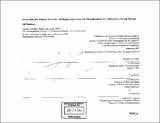Interconnected musical networks : bringing expression and thoughtfulness to collaborative group playing
Author(s)
Weinberg, Gil, 1967-
DownloadFull printable version (27.59Mb)
Other Contributors
Massachusetts Institute of Technology. Dept. of Architecture. Program in Media Arts and Sciences.
Advisor
Tod Machover.
Terms of use
Metadata
Show full item recordAbstract
(cont.) In order to addressee the latter challenge I have decided to employ the digital network--a promising candidate for bringing a unique added value to the musical experience of collaborative group playing. I have chosen to address both challenges by embedding cognitive and educational concepts in newly designed interconnect instruments and applications, which led to the development of a number of such Interconnected Musical Networks (IMNs)--live performance systems that allow players to influence, share, and shape each other's music in real-time. In my thesis I discuss the concepts, motivations, and aesthetics of IMNs and review a number of historical and current technological landmarks that led the way to the development of the field. I then suggest a comprehensive theoretical framework for artistic interdependency, based on which I developed a set of instruments and activities in an effort to turn IMNs into an expressive and intuitive art form that provides meaningful learning experiences, engaging collaborative interactions, and worthy music. Music today is more ubiquitous, accessible, and democratized than ever. Thanks to technologies such as high-end home studios, audio compression, and digital distribution, music now surrounds us in everyday life, almost every piece of music is a few minutes of download away, and almost any western musician, novice or expert, can compose, perform and distribute their music directly to their listeners from their home studios. But at the same time these technologies lead to some concerning social effects on the culture of consuming and creating music. Although music is available for more people, in more locations, and for longer periods of time, most listeners experience it in an incidental, unengaged, or utilitarian manner. On the creation side, home studios promote private and isolated practice of music making where hardly any musical instruments or even musicians are needed, and where the value of live group interaction is marginal. My thesis work attempts to use technology to address these same concerning effects that it had created by developing tools and applications that would address two main challenges: 1. Facilitating engaged and thoughtful as well as intuitive and expressive musical experiences for novices and children 2. Enhancing the inherent social attributes of music making by connecting to and intensifying the roots of music as a collaborative socialritual. My approach for addressing the first challenge is to study and model music cognition and education theories and to design algorithms that would bridge between the thoughtful and the expressive, allowing novices and children an access to meaningful and engaging musical experiences.
Description
Thesis (Ph. D.)--Massachusetts Institute of Technology, School of Architecture and Planning, Program in Media Arts and Sciences, 2003. Includes bibliographical references (p. 211-219).
Date issued
2003Department
Program in Media Arts and Sciences (Massachusetts Institute of Technology)Publisher
Massachusetts Institute of Technology
Keywords
Architecture. Program in Media Arts and Sciences.